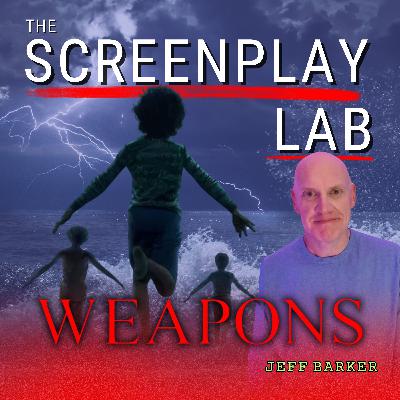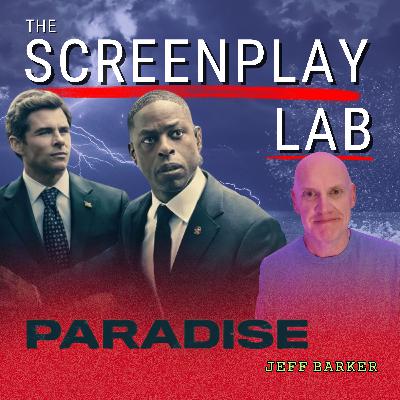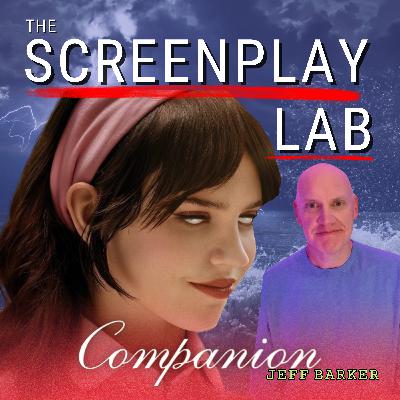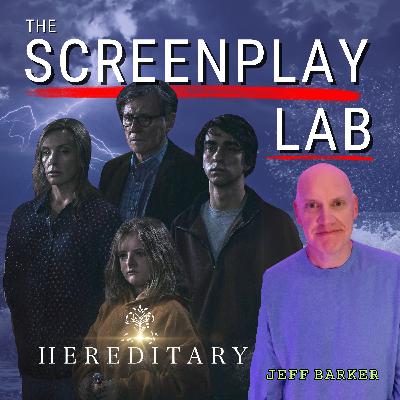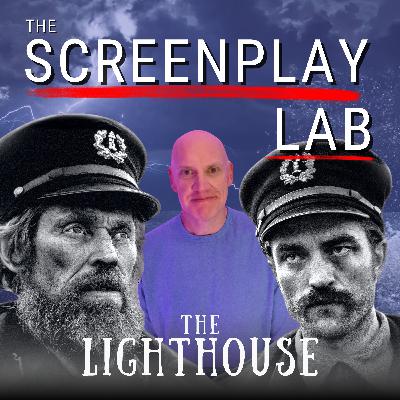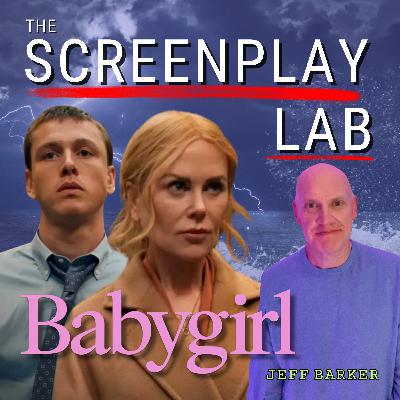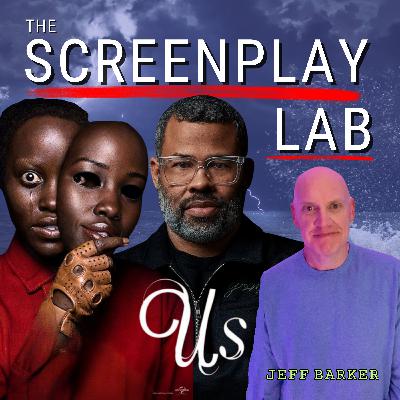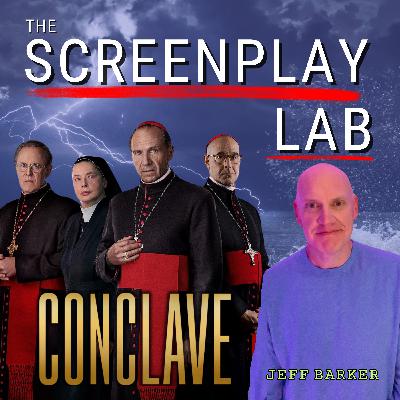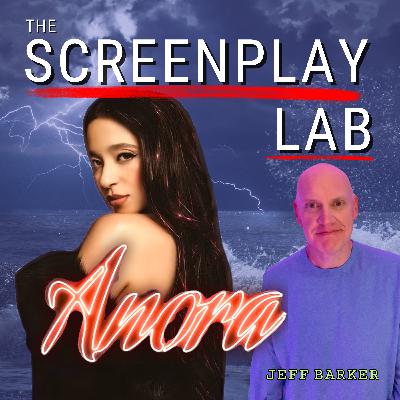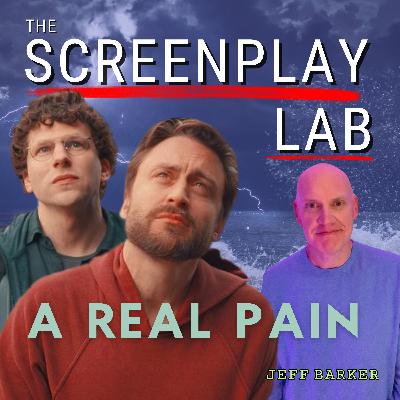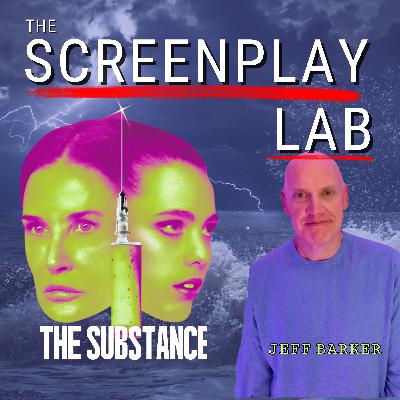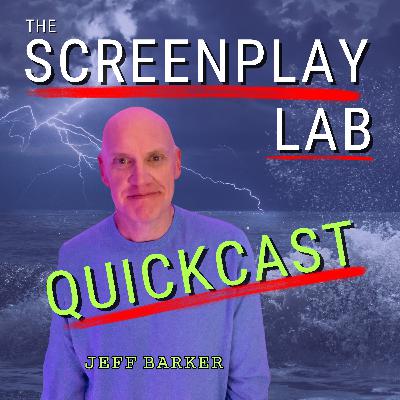Discover The Screenplay Lab
The Screenplay Lab

The Screenplay Lab
Author: Jeff Barker
Subscribed: 2Played: 0Subscribe
Share
© 2025
Description
Join us as we analyze one screenplay at a time, celebrating its stand-alone beauty as a unique literary device, independent of the final film. From exploring tone and theme to dissecting structure and unforgettable characters, we break down what makes each script sizzle. Dive into the rich imagery and clever narrative devices that create a sensory experience on the page. Hosted by Jeff Barker, this storytelling podcast offers a deep dive into the creativity and precision of screenwriting.
24 Episodes
Reverse
In this episode, we break down the writing journeys and signature styles of some of today's most influential screenwriters and filmmakers: Aaron Sorkin (A Few Good Men, The West Wing, The Social Network) Ari Aster (Hereditary, Midsommar, Beau Is Afraid) Greta Gerwig & Noah Baumbach (Lady Bird, Barbie, Marriage Story) Zach Cregger (Barbarian, Weapons) Dan Fogelman (Cars, Tangled, Crazy Stupid Love, This Is Us) We explore how each broke into Hollywood, the themes that define their work, and what screenwriters and filmmakers can learn from their careers. From Sorkin's rapid-fire dialogue to Aster's grief-driven horror, Gerwig's character-first voice, Cregger's puzzle-box horror, and Fogelman's heartfelt ensemble dramas, this episode is packed with craft insights and career lessons. Perfect for aspiring screenwriters, working filmmakers, and fans of great storytelling. Jeff-Barker.com Video Podcast
In this episode of The Screenplay Lab, screenwriter Jeff Barker unpacks the chilling, nonlinear script for Weapons, the latest horror mystery from Barbarian writer-director Zack Cregger, starring Josh Brolin and Julia Garner. We explore Cregger's six-character POV structure, inventive formatting, and masterful use of suspense. From small-town dread to shocking final moments, you'll learn how Weapons weaves multiple perspectives into a gripping, layered narrative. Whether you're a screenwriter, filmmaker, or horror fan, this deep dive reveals storytelling lessons you can apply to your own work. Jeff Barker's Website Video Podcast
Breaking Down Hulu's Paradise Pilot by Dan Fogelman: Teleplay Analysis & Screenwriting Lessons In this episode of The Screenplay Lab podcast, we analyze the pilot teleplay for Paradise, the Emmy-nominated 2025 Hulu series from Dan Fogelman (This Is Us). If you're a screenwriter, TV writer, or filmmaker, this deep dive into modern pilot structure is a must-listen. What You'll Learn: How to write a pilot twist that actually works Dan Fogelman's use of nonlinear storytelling and emotional payoff Setups/payoffs, mechanics, and pacing in a 55-page script Crafting dialogue, formatting tips, and white space usage Behind-the-scenes: how Paradise became a $15M-per-episode drama Genre blending: sci-fi, political thriller, and character-driven drama We Break Down: Script structure Use of time jumps, flashbacks, and visual storytelling on the page Clues leading to one of the most effective pilot twists in recent TV Whether you're writing your first pilot or refining a series bible, this episode offers practical insights from a modern masterpiece in TV writing. Video Podcast Jeff Barker's Website
Why Did Barbie (2023) Become a Screenwriting Phenomenon? | The Screenplay Lab Podcast Join screenwriter Jeff Barker as he dives deep into the Barbie (2023) screenplay — the bold, Oscar-nominated script by Greta Gerwig and Noah Baumbach that turned a global icon into a billion-dollar box office hit. In this episode of The Screenplay Lab, we break down the film's groundbreaking structure, unforgettable characters, and genre-defying mix of fantasy, satire, and heart. 🎬 What we explore: ✔️ The Barbie screenplay's unique structure, style, and voice ✔️ How Gerwig & Baumbach crafted iconic characters like Barbie and Ken ✔️ The film's sharp comedy, cultural commentary, and lasting impact ✔️ Screenwriting techniques for dialogue, world-building, and dual protagonists ✔️ Behind-the-scenes insights on Margot Robbie, Ryan Gosling, and Barbie's billion-dollar success Whether you're a screenwriter, filmmaker, storyteller, or a fan of Barbie, this in-depth screenplay analysis will sharpen your craft — and change how you see this cultural phenomenon. 🎧 Subscribe for screenwriting deep dives, film analysis, and storytelling insights. Jeff Barker Website YouTube Podcast
What makes Aaron Sorkin's The Social Network one of the most studied and celebrated screenplays of the last 20 years? In this episode of Screenplay Lab, host Jeff Barker breaks down The Social Network scene by scene, revealing why its rapid-fire dialogue, layered structure, and relentless conflict have made it a benchmark for screenwriters everywhere. We explore: – Why the cold open hook grabs you instantly – How Sorkin's nonlinear structure strengthens emotional payoff – The formatting, pacing, and "white space" secrets that keep readers turning pages – Why conflict in every scene matters, and how to apply this to your own scripts – Writing for actors through effective character intros – How to write with voice while respecting cinematic clarity – Behind-the-scenes insight on how Sorkin's draft became the film almost word-for-word Whether you're a screenwriter looking to sharpen your craft, a filmmaker studying how structure supports story, or simply love movies and want to understand why The Social Network endures, you'll walk away with clear, actionable takeaways to level up your writing. 🎙️ About The Screenplay Lab: We study and appreciate screenplays as stand-alone literary works, not just blueprints for film. We deconstruct a script in each episode, uncovering what makes it unique and exploring what writers can learn. 📢 Join the Conversation! 💬 Like this episode? Subscribe, rate, and leave a review! ✅ Jeff Barker's Website ✅Video Podcast on YouTube
In this episode of The Screenplay Lab, Jeff Barker explores the creative journeys of some of today's most exciting screenwriters and filmmakers, from Oscar winners to breakout indie voices. We dive deep into the writing styles, influences, and careers of: 🧠 Jesse Eisenberg (A Real Pain) 🔥 Coralie Fargeat (Revenge, The Substance) 🌊 Trey Edward Shults (Waves, It Comes at Night) 👁 Jordan Peele (Us, Get Out) 🌑 Robert & Max Eggers (The Lighthouse, Nosferatu) 💀 Ari Aster (Hereditary, Midsommar, Eddington) 💀 Curry Barker (Milk & Serial, Obsession) 🤖 Drew Hancock (Companion) 🎾 Justin Kuritzkes (Challengers) 🥁 Damien Chazelle (Whiplash, La La Land) 🕵️ Peter Straughan (Tinker Tailor Soldier Spy, Conclave) 🩸 Halina Reijn (Bodies Bodies Bodies, Babygirl) 🎤 Brady Corbet & Mona Fastvold (Vox Lux, The Brutalist) 🌆 Sean Baker (The Florida Project, Anora) Plus, a special conversation with rising creator Curry Barker about Jordan Peele's influence on his own filmmaking, writing horror, and creating cinematic sketch comedy. If you're into screenwriting, directing, or just love bold modern cinema, this episode is packed with insights and inspiration. 🎬 Subscribe, rate, and follow The Screenplay Lab for more in-depth breakdowns of the screenwriters shaping today's film landscape. ✅ Jeff Barker's Website ✅Video Podcast on YouTube
In this episode of Screenplay Lab, we dive into the genre-bending screenplay of Companion (2025), a sci-fi horror comedy written and directed by debut filmmaker Drew Hancock. Starring Sophia Thatcher (Yellowjackets) and Jack Quaid (The Boys), Companion is a bold, twisty narrative that shifts from dark comedy to sci-fi thriller to full-on horror, all while tackling themes like toxic masculinity, autonomy, and identity. We break down what makes this screenplay stand out—from crisp formatting and dry wit to inventive exposition and layered symbolism. If you're a screenwriter, filmmaker, or fan of smart genre storytelling, this episode is packed with insights you won't want to miss. In this episode: How Companion nails exposition and formatting Symbolism deep dive (yes, including that Goo Goo Dolls moment) Script vs. screen: What changed and why The evolution of Drew Hancock as a writer-director Standout performances from Thatcher and Quaid Comparisons to films like Barbarian Whether you're here to level up your craft or just love a smart, surprising screenplay, this episode delivers. 🎙️ About The Screenplay Lab: We study and appreciate screenplays as stand-alone literary works, not just blueprints for film. We deconstruct a script in each episode, uncovering what makes it unique and exploring what writers can learn. 📢 Join the Conversation! 💬 Like this episode? Subscribe, rate, and leave a review! ✅ Jeff Barker's Website ✅Video Podcast on YouTube
Ari Aster's Hereditary – Prestige Horror Screenwriting In this episode, Jeff Barker breaks down the Hereditary screenplay by Ari Aster, the 2018 A24 film that redefined modern horror. Whether you're a screenwriter, filmmaker, or horror fan, this deep dive explores how Aster builds emotional horror through grief, trauma, and supernatural dread. We'll analyze formatting, structure, pacing, dialogue, and how this script balances psychological tension with occult terror. Plus: why Toni Collette's performance deserved an Oscar, and how Hereditary changed horror screenwriting forever. 🎬 Topics Include: Elevated horror & genre subversion Ari Aster's writing style & story structure Emotional realism in horror Screenplay statistics, POV, pacing, formatting Character development & theme layering The psychology behind Hereditary's horror Perfect for: 🖊️ Screenwriters 🎥 Indie filmmakers 🧠 Film students 💀 Horror lovers 📚 A24 and Ari Aster fans 🎙️ About The Screenplay Lab: We study and appreciate screenplays as stand-alone literary works, not just blueprints for film. We deconstruct a script in each episode, uncovering what makes it unique and exploring what writers can learn. 📢 Join the Conversation! 💬 Like this episode? Subscribe, rate, and leave a review! ✅ Jeff Barker's Website ✅Video Podcast on YouTube
Welcome to The Screenplay Lab, the podcast that treats screenplays like the art they are. I'm Jeff Barker, a screenwriter, and in this episode, we're dissecting the bold, layered, and seductive script behind Challengers (2024) — written by Justin Kuritzkes and directed by Luca Guadagnino. Starring Zendaya, Josh O'Connor, and Mike Faist, Challengers is far more than a steamy love triangle on a tennis court. It's nonlinear storytelling at its sharpest, with subtext-rich dialogue, shifting POVs, and a screenplay that's as cinematic on the page as it is on screen. 🎾 What's inside this breakdown: Emotional momentum in a nonlinear structure Power, seduction & control — tennis as metaphor Subtext-laced dialogue that leaves an impact Multiple perspectives told with clarity and flair Formatting risks: mini-slugs, bold text, "thwaacckkk", and more How Challengers blends sports drama, erotic thriller, and psychological tension We also explore how Justin Kuritzkes transitioned from a viral YouTuber to a Black List screenwriter, how the script evolved in collaboration with Zendaya and Guadagnino, and what this film teaches us about modern cinematic storytelling. 💡 Plus: Comparisons to Eternal Sunshine, symbolism deep-dives, and why this screenplay hits harder than a Grand Slam serve. 🎙️ About The Screenplay Lab: We study and appreciate screenplays as stand-alone literary works, not just blueprints for film. We deconstruct a script in each episode, uncovering what makes it unique and exploring what writers can learn. 📢 Join the Conversation! 💬 Like this episode? Subscribe, rate, and leave a review! ✅ Jeff Barker's Website ✅Video Podcast on YouTube
In this episode of The Screenplay Lab, host and screenwriter Jeff Barker takes a closer look at the screenplay behind La La Land by Damien Chazelle. Known for its music and emotional impact, this film offers just as much inspiration on the page as it does on the screen. Jeff examines how the screenplay employs musical storytelling without lyrics, subverts traditional romantic structures, and utilizes formatting and choreography to convey character and emotion. He also shares the backstory behind the script's development, early rejections, and how Whiplash helped bring La La Land back to life. Whether you are a screenwriter, filmmaker, or a fan of the film and its stars, Ryan Gosling and Emma Stone, this episode reveals what makes the script stand out and what writers can take into their own work. Highlights include • Writing visual musical sequences • How the screenplay was originally developed and rejected • Chazelle's use of structure and seasonality • Standout dialogue and formatting choices • What the ending teaches about character and storytelling 🎙️ About The Screenplay Lab: We study and appreciate screenplays as stand-alone literary works, not just blueprints for film. We deconstruct a script in each episode, uncovering what makes it unique and exploring what writers can learn. 📢 Join the Conversation! 💬 Like this episode? Subscribe, rate, and leave a review! ✅ Jeff Barker's Website ✅Video Podcast on YouTube
In this episode of The Screenplay Lab, host and screenwriter Jeff Barker takes a deep dive into the brilliantly unhinged screenplay for The Lighthouse (2019), written by Robert and Max Eggers. This A24 psychological horror film, starring Willem Dafoe and Robert Pattinson, is a claustrophobic two-hander soaked in myth, madness, and maritime misery. We explore how the Eggers brothers crafted a literary and cinematic fever dream, from unique formatting and surreal dialogue to powerful monologues, historical dialect, and deep symbolism. This script is weird in all the right ways, and there's a ton writers can learn from it. 🧠 Topics covered: Development history & Poe inspiration Dialogue rhythm & page formatting tricks Character duality & identity symbolism Cinematic writing techniques on the page Why this screenplay is a masterclass in tension and tone 🎙️ About The Screenplay Lab: Welcome to The Screenplay Lab, where we study and appreciate screenplays as stand-alone literary works, not just blueprints for film. We deconstruct a script in each episode, uncovering what makes it unique and exploring what writers can learn. 📢 Join the Conversation! 💬 Like this episode? Subscribe, rate, and leave a review! ✅ Jeff Barker's Website ✅Video Podcast on YouTube
In this episode of The Screenplay Lab, Jeff Barker deconstructs the provocative and award-winning screenplay for Babygirl (2024), written and directed by Halina Reijn and starring Nicole Kidman and Harris Dickinson. This psychological erotic thriller, produced by A24, subverts the genre by placing a powerful woman at the center of a dark, complex, and unapologetic power dynamic. We explore the screenplay as a literary document, not just a blueprint for the film. From formatting and scene structure to dialogue, symbolism, and raw emotional dynamics, this in-depth exploration offers genuine insight for screenwriters, filmmakers, and storytelling enthusiasts. What makes Babygirl's screenplay bold and original The use of power, shame, and desire in character-driven storytelling How Halina Reijn formats scenes, montages, and intercut sequences Key screenwriting techniques: pre-laps, interiority, camera direction, and more Dialogue breakdowns that show character tension at its finest Themes of vulnerability, domination, and identity Whether you're writing your first screenplay or are a seasoned professional, this episode offers a fresh perspective on crafting emotionally layered, visually rich, and thematically daring stories. BABYGIRL SCREENPLAY 🎙️ About The Screenplay Lab: Welcome to The Screenplay Lab, where we study and appreciate screenplays as stand-alone literary works, not just blueprints for film. We deconstruct a script in each episode, uncovering what makes it unique and exploring what writers can learn. 📢 Join the Conversation! 💬 Like this episode? Subscribe, rate, and leave a review! ✅ Jeff Barker's Website ✅Video Podcast on YouTube
In this deep-dive podcast episode, screenwriter Jeff Barker explores Trey Edward Shults' emotionally captivating screenplay, Waves (2019), an A24 cult classic praised especially by Gen Z audiences for its unique storytelling and profound emotional resonance. Discover how Shults innovatively uses screenplay conventions alongside experimental techniques like dual dialogue columns, creative text-message formatting, bold musical integration featuring artists like Frank Ocean, Kendrick Lamar, Radiohead, and Tyler the Creator; and striking cinematography choices, including shifting aspect ratios and immersive camera movements to heighten storytelling. Jeff reveals the deeply personal origins behind Shults' powerful narrative, examining how themes of grief, family trauma, generational conflict, toxic masculinity, forgiveness, and resilience create authenticity and emotional depth. Whether you're a filmmaker, screenwriter, or film enthusiast, this episode offers valuable insights into: Crafting dual-dialogue columns and unconventional screenplay formatting The symbolic meaning behind "Waves" Integrating contemporary music to amplify storytelling Techniques for portraying complex family dynamics and emotional landscapes Cinematic strategies like unique aspect ratios, camera techniques, and pacing Key screenplay statistics and comparisons to traditional screenwriting practice 🎙️ About The Screenplay Lab: We study and appreciate screenplays as stand-alone literary works, not just blueprints for film. 📢 Join the Conversation! 💬 Like this episode? Subscribe, rate, and leave a review! ✅ Jeff Barker's Website ✅Video Podcast on YouTube
In this special audio episode, host and screenwriter Jeff Barker dives deep into the genius behind Jordan Peele's groundbreaking screenplay, "Us" (2019). Explore how Peele intricately weaves supernatural horror, psychological depth, and relentless suspense into a captivating narrative that examines powerful societal themes like class division, identity, and confronting our inner darkness. Plus, enjoy an insightful conversation with acclaimed actor, comedian, and director Curry Barker, discussing the profound influence of Jordan Peele and "Key & Peele" on his comedic style (That's A Bad Idea) and filmmaking career (Milk & Serial). Jeff meticulously analyzes Peele's unique screenwriting style, unpacking his use of pacing, symbolism, compelling flashbacks, and sharp dialogue. You'll also discover practical screenwriting techniques inspired by Peele's visionary storytelling to help elevate your writing. Whether you're a screenwriter, filmmaker, or a dedicated Jordan Peele fan, this episode provides invaluable insights into the art and craft of storytelling. Episode Highlights: Deep screenplay analysis of Jordan Peele's "Us" Exploration of symbolism, hidden meanings, and societal commentary Practical tips and screenwriting strategies inspired by Peele's writing Behind-the-scenes insights into Peele's filmmaking approach Exclusive interview with Curry Barker on comedy, creativity, and Jordan Peele's legacy US - Screenplay 📢 Join the Conversation! 💬 Like this episode? Subscribe, rate, and leave a review! ✅ Jeff Barker's Website ✅Video Podcast on YouTube
Join us for a riveting exploration of THE BRUTALIST, the film that has stormed the Oscars with ten nominations, including Best Original Screenplay, Best Picture, and Best Director. In this episode, we dissect the genius of Brady Corbet and Mona Fastvold's screenplay, an intense period drama that goes beyond mere architectural discourse to challenge the very fabric of the American Dream. What we'll cover: ✅ Screenwriting: Brady Corbet and Mona Fastvold's visionary writing that's as bold and uncompromising as the brutalist structures that frame this narrative. ✅ Narrative Architecture: How the screenplay constructs a compelling narrative that intertwines personal trauma with societal reconstruction. ✅ Character Analysis: Deep dives into the complex characters portrayed by Adrien Brody, Felicity Jones, and Guy Pearce—each adding depth and authenticity to this riveting story. ✅ Symbolic Structures: The role of brutalist architecture in reflecting the inner turmoil and ideological battles of the protagonists. ✅ Scene Breakdowns: Key scenes that define the screenplay's strength and why they resonate with audiences and critics alike. Why Listen: Whether you're a film student, a screenwriter, or just a lover of finely-crafted cinema, this episode offers you a detailed behind-the-scenes look at what makes THE BRUTALIST a potential Oscar winner. From the script's intricate layers to the stellar performances and groundbreaking direction, find out what sets this film apart in the panorama of modern cinema. THE BRUTALIST - Screenplay 📢 Join the Conversation! 💬 Like this episode? Subscribe, rate, and leave a review! ✅ Jeff Barker's Website ✅Video Podcast on YouTube
In this episode, Jeff Barker takes a deep dive into CONCLAVE, the Oscar-nominated screenplay written by Peter Straughan. Adapted from Robert Harris' novel, this gripping script blends political intrigue, religious drama, and even sports movie elements, creating one of the most unique and suspenseful screenplays of the year. 🔥 What We Cover in This Episode: ✔️ The real-life inspiration behind CONCLAVE ✔️ Why this screenplay feels like a sports movie disguised as a political thriller ✔️ The screenplay's unique formatting, dialogue techniques, and structure ✔️ The power struggles, ethical dilemmas, and conspiracies at the heart of the story ✔️ How Edward Berger's direction and an all-star cast brought the script to life 🏆 Award Buzz & Recognition: 8 Academy Award Nominations, including Best Picture & Best Adapted Screenplay Golden Globe Winner – Best Screenplay BAFTA & AFI Movie of the Year Winner CONVLAVE - Screenplay 📢 Join the Conversation! 💬 Like this episode? Subscribe, rate, and leave a review! ✅ Jeff Barker's Website ✅Video Podcast on YouTube
Sean Baker's Anora is a Romantic Drama turned Thriller infused with comedy and sharp social commentary. Recently nominated for SIX Academy Awards, including Best Original Screenplay, this modern anti-Cinderella story explores love, independence, and class conflict with breathtaking nuance. What to expect in this episode: The brilliance of Sean Baker's character-driven storytelling and unique writing style. How Anora balances slapstick humor and emotional depth. A scene-by-scene breakdown: what makes this script so gripping and worthy of an Oscar nod. Symbolism, setting, and the themes of agency and societal expectations. Behind-the-scenes insights, from Mikey Madison's standout performance to Baker's collaboration with real-world consultants. This podcast is perfect for screenwriters, film enthusiasts, and anyone who loves diving into the craft of storytelling. 🎙️ About The Screenplay Lab: Welcome to The Screenplay Lab, where we study and appreciate screenplays as stand-alone literary works, not just blueprints for film. We deconstruct a script in each episode, uncover what makes it unique, and explore what writers can learn. Anora - Screenplay 📢 Join the Conversation! 💬 Like this episode? Subscribe, rate, and leave a review! ✅ Jeff Barker's Website ✅Video Podcast on YouTube
Jesse Eisenberg's A Real Pain isn't just an Oscar-nominated screenplay. It's a strong example of character-driven storytelling, mental health representation, and emotional depth. In this episode of The Screenplay Lab, we break down the script, analyze its hidden meanings, and explore how Eisenberg crafts psychologically rich characters through his minimalist yet impactful writing style. 🔹 What You'll Learn in This Episode: ✔️ The 4 Hidden Meanings Behind A Real Pain ✔️ How Jesse Eisenberg's Screenplay Captures Trauma & Mental Health ✔️ Why This Script Deserved Its Academy Award Nomination ✔️ A Deep Dive into Benji's Personality & Psychological Complexity ✔️ Screenwriting Techniques That Make This Script Stand Out 🏆 A Real Pain – Academy Award Nominations: 🎭 Best Original Screenplay – Jesse Eisenberg 🎭 Best Supporting Actor – Kieran Culkin This film is more than just a road trip story - it's a poignant exploration of grief, identity, and inherited trauma, all wrapped in sharp dialogue, dry humor, and deep human conflict. As a screenwriter and former medical professional in psychiatry, I break down how Eisenberg accurately portrays personality disorders and coping mechanisms in a way that feels real and relatable. 🎙️ About The Screenplay Lab: Welcome to The Screenplay Lab, where we study and appreciate screenplays as stand-alone literary works. Episode Links: Scriptnotes Podcast Interview with John August A REAL PAIN - Screenplay Curry Barker 📢 Join the Conversation! 💬 Like this episode? Subscribe, rate, and leave a review! ✅ Jeff Barker's Website ✅Video Podcast on YouTube
This week, we're diving into THE SUBSTANCE by Coralie Fargeat, the Academy Award-nominated satirical psychological body horror film that's making waves with its visceral storytelling and extensive practical effects. We'll explore how this screenplay drives readers to confront themes of aging, beauty, and perfection, all while dissecting its bold stylistic choices, from black-highlighted text to strategic formatting tricks that amplify tension and horror. We'll also take a deep dive into Fargeat's signature storytelling - her influences from Cronenberg and Lynch, her fearless exploration of female empowerment, identity, and transformation, and how she meticulously crafted this screenplay from a 2017 coffee shop draft to an $18M Cannes-winning sensation. 🔬 What We'll Analyze: ✅ The screenplay's 5-act structure and how it delivers a tragic, unsettling narrative ✅ The dense, immersive writing style that reads like a literary experience ✅ The visual storytelling techniques- from bold fonts to POV shots inside objects ✅ Thematic breakdown: the cost of perfection, loss of identity, and society's obsession with youth ✅ Symbolism - how motorcycles, spiders, and black screen transitions deepen the film's meaning If you're fascinated by screenwriting craft, horror, and films that push boundaries, this episode is for you. 🎧 Subscribe, share, and join the conversation! Find me on Substack for deeper dives, follow my website Jeff-Barker.com, and connect on social media.
This week, we're diving deep into A Complete Unknown, the Academy Award-nominated Bob Dylan biopic by James Mangold and Jay Cocks. In this QUICKCAST episode, we break down the creative changes that took this film from script to screen. From missing scenes (remember Johnny Cash jumping into a stranger's car?) to reimagined character moments and modified dialogue. Here's what we'll cover: ✔️ The "show, don't tell" moments that didn't make it. ✔️ How Sylvie's character arc shifted (and why Elle Fanning still nailed it). ✔️ Dialogue trims, symbolism cuts, and reworked scenes—what changed and why? ✔️ The creative process behind these modifications and how collaboration plays a role. 🎥 Why do these changes happen? We'll explore the three key stages where films evolve: preproduction, on-set collaboration, and editing. Plus, how James Mangold's dual role as writer and director influenced the final product. 👉 Don't forget to like, comment, and subscribe for more deep dives into the art of screenwriting and filmmaking. ❤️ Find The Screenplay Lab everywhere: ✅ Jeff Barker's Website ✅YouTube Podcast Videos


